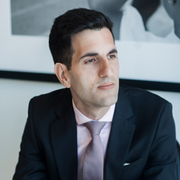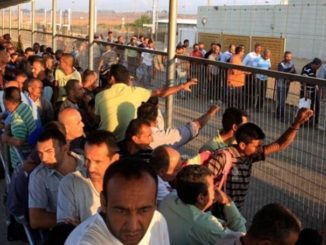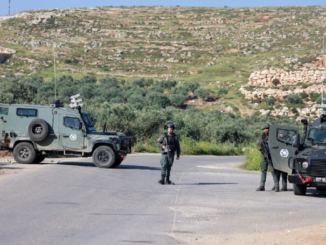
This week Joel Harden, a Canadian member of Ontario’s provincial parliament, made this unnecessary apology:
“I would like to apologize unreservedly to the Jewish community for comments I made during an interview with the Ottawa Forum on Israel Palestine. I spoke in a way that perpetrated an antisemitic stereotype towards Jewish neighbours. I regret my choice of words and sincerely apologize to the Jewish community. You have my commitment that it won’t happen again and I will continue to work with Jewish leaders who can help me understand antisemitism.”
Specifically, the apology was made in reference to this statement he made in the interview, in August 2021:
“If I were to name…the single greatest threat, the single greatest origin of violence in the Middle East, it is unquestionably the state of Israel and the way in which they feel absolutely no shame in defying international law, doing whatever they want.”
There’s nothing wrong with this since, first, it’s no secret that Israel has absolutely no reservations about and is routinely breaking international law (as confirmed by the United Nations, Amnesty International, other major human rights organizations the world over) and, second, whether Israel is in fact “the single greatest origin of violence in the Middle East” is at worst only debatable.
Given that Israel is constantly demolishing Palestinian properties, opening live fire and killing Palestinian civilians, illegally raiding Palestinian homes, physically and mentally (as through its military) harassing Palestinians, detaining them without any charge whatsoever, and holding them indefinitely behind bars (often referred to more nicely as “administrative detention”)—just to name a few of its crimes and in addition to its periodic bombing of Gaza (a densely open-air prison where Palestinians are wholly defenseless)—it is hardly a farfetched a view that Israel is the “single greatest origin of violence in the Middle East.”
To go any further at this point in listing Israeli crimes is simply to repeat what’s already been public for long. Motasem A Dalloul, in a recent article published in Middle East Monitor, succinctly notes what ultimately needs to be stressed:
“For 70 years Israel has been the subject of numerous UN resolutions, statements of condemnation and rulings of the illegality of its policies against Palestinians and yet no sanctions have been imposed against it nor have Palestinians been given aid to combat its aggression.”
In fact, as in the cast of Harden, we see the opposite, namely politicians and others apologizing for truthfully speaking to the illegality in question. Aside from such apologies being unnecessary they reflect four problematic issues, concerning Israeli ideologues.
First, Israeli ideologues, including the Centre for Israel and Jewish Affairs (CIJA) that took exception to Harden’s statement, don’t want to be criticized about Israeli criminality. Ever. In their view, if you draw attention to any of the various modes in which they are engaged in the ethnic cleansing of Palestine, whether outside the head (e.g. bombing of Gaza and Israeli settlement displacement) or inside the head (e.g. erasing Palestine from our memory and concerns), is already to have gone too far. And we know where that leads: being called “antisemitic.”
Stated bluntly, if you think that taking issue with what Israel is doing to Palestine is “antisemitic”, there’s something seriously amiss. Not with the person taking issue but with your thinking. It is so ludicrous to associate, at a very basic level, antisemitism with legit criticism of any state at all, let alone Israel, that the burden of proof is on you—not me—to explain the logic of that. Recalling, as I write, my time as a philosophy instructor, it would have admittedly made for an interesting assignment, where students would be challenged to demonstrate their argumentative abilities.
But should you have handed in, say, an essay where the constant refrain throughout is that criticism of Israel amounts to “antisemitism”, despite the criticism focused exclusively on its actions alone, you’d of course receive a failing grade. By the same token—and if we’re sincere about being “modern” (a word progressives and liberals love to apply to themselves) such that we accept that truth requires justifying what we say with material facts—equating criticism of Israel as antisemitic is empirically bankrupt.
Second, Israeli ideologues lie about the Palestinian struggle for justice and history. And no one among them corrects them for doing so. One example that immediately comes to mind is how they do this with respect to the phrase “from the river to the sea, Palestine will be free.” So often they, perfectly illustrated in this recent op-ed, attack it as a call to pro-Palestinian terrorism. Had Harden or any other Canadian politician done the same the ideologues would not come after them. It’s as if the Israeli ideologue cannot process the basic idea that the phrase refers to the rightful liberation of the Palestinian people, covering the geographic expanse of the Jordan River to the Mediterranean Sea.
What they’d like the world to falsely believe is that it means annihilating Israelis. No doubt this is a kind of fear-mongering to not only vilify Palestinians and their allies but also to drum up further support for the continuation of Israel’s ethnic cleansing of Palestine. Sociopaths act similarly. They manipulate you to believe in certain lies so you, acting accordingly, advance some particular agenda. Even when doing so is to your own or others’ detriment.
Third and finally, Israeli ideologues are selective about what they mean by “antisemitism.” Preposterous criticism of Israel, for them, amounts to such hatred but slandering or demeaning Jews as “self-hating” for supporting the Palestinian struggle for justice is not. An egregious incident where this happened, involving Palestinian solidarity expressed by Hasidic Jews in Toronto this year and detailed well by Montreal activist and writer Yves Engler, is a case in point. CIJA, among other Israeli ideologues, surely knows about this. They are, without fail, vigilant in documenting all antisemitic incidents that happen in Canada. They however do not respond to those where the targets of the incidents are pro-Palestinian.
Ignoring antisemitism when it occurs against pro-Palestinian Jews while condemning all other forms of antisemitism (perceived, such as criticism against Israel, or real, such as denying a person entry somewhere because they are Jewish), is more than turning a blind eye. It’s outright deplorable. It means that the pro-Palestinian Jew is “less” a Jew. Conversely, and following this perverse logic, being “Jewish” entails supporting the Israeli oppression of Palestine. Should you challenge that you are a “traitor” to other “real” Jews who will not come to your aid or safety?
Those publicly endorsing such thinking should be apologizing for offending being antisemitic. Those, however, fighting for Palestinian justice—Jews and non-Jews alike—have nothing to be sorry about. Remember this, dear Palestinian allies. As much as each of us is flawed, not perfect, and have things about ourselves that we have to work on, you do no harm when you oppose the unconscionable crimes that Israel—as a violent state and not the exclusive representative of worldwide Jewry—perpetrate daily against the Palestinian people. You will likely offend those who, lacking conscience, want it otherwise. But that is their failing. Not ours.
Do not let it deter you from engaging in the Palestinian struggle. There is lots of good, however difficult, work left to be done.

– Paul Salvatori is a Toronto-based journalist, community worker and artist. Much of his work on Palestine involves public education, such as through his recently created interview series, “Palestine in Perspective” (The Dark Room Podcast), where he speaks with writers, scholars and activists. He contributed this article to The Palestine Chronicle.








